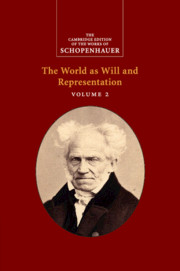Chapter 28 - Characterization of the Will to Life
Published online by Cambridge University Press: 30 June 2022
Summary
Our Second Book concludes with the question of the aim and goal of that will that has proven to be the essence in itself of all things in the world. The following remarks will serve to supplement the broader answer we gave there, by describing the general character of that will.
This sort of characterization is possible because we have recognized the inner essence of the world to be something thoroughly actual and empirically given. By contrast, even the name ‘World-Soul’ which is used by some to describe that inner essence, gives a mere entity of reason instead: for ‘soul’ means an individual unity of consciousness that obviously does not accrue to that essence, and quite generally the concept of ‘soul’ is unjustified and therefore useless, because it hypostasizes cognition and willing into an inseparable connection that is thereby independent of the animal organism. The word should only ever be used figuratively because it is by no means as innocent as psuchê or anima, which mean ‘breath’. –
The so-called pantheists however use even less appropriate forms of expression: their whole philosophy consists primarily in calling the inner essence of the world, of which they have no understanding, ‘God’; and they think of this as a great achievement. According to this view, the world would then be a theophany. But cast only one single glance at this world of beings in constant need, continuing to existing for some stretch of time only by eating each other, passing their existence in fear and want and often enduring horrible suffering until finally flinging themselves into the arms of death: whoever keeps this clearly in view will allow that Aristotle is right when he says ‘nature is demonic, not divine’ (On Divination in Sleep, ch. 2, p. 463); indeed, he must admit that a god who would presume to be transformed into such a world reallymust have been plagued by the devil. – I know full well that supposed philosophers of this century emulate Spinoza and think they are justified in doing so. But Spinoza had special reasons for calling his unitary substance ‘God’ so as to salvage at least theword if not the thing.
- Type
- Chapter
- Information
- Schopenhauer: The World as Will and Representation , pp. 364 - 376Publisher: Cambridge University PressPrint publication year: 2018

